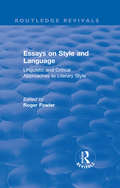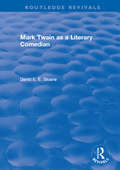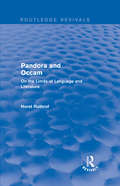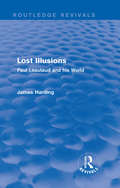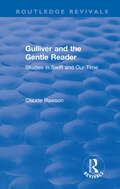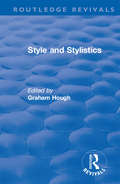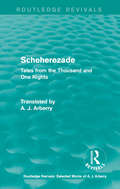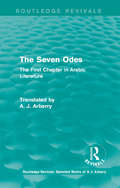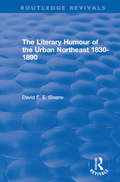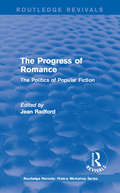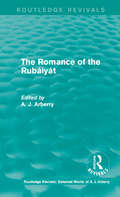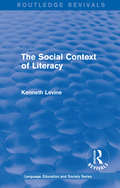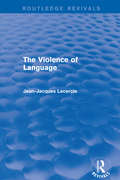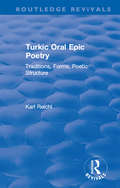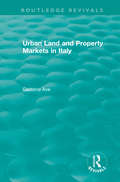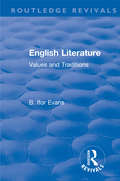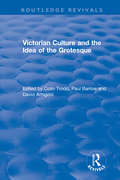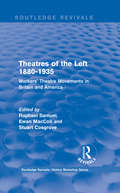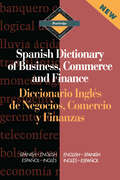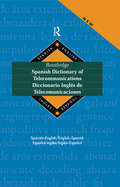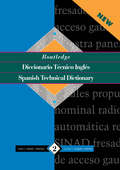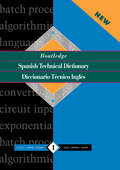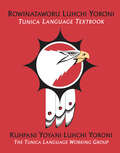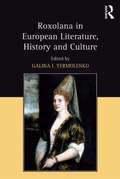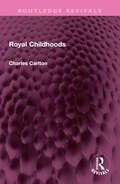- Table View
- List View
Routledge Revivals: Linguistic and Critical Approaches to Literary Style (Routledge Revivals)
by Roger FowlerFirst published in 1966, this book is contributed to by authors who share an interest in the literary uses of language. The book gives a close analysis of the language of literature contributed to by critics and linguists, examining linguistic theory and poetry, and as part of this the rhythm and metre of English poetry is deconstructed. Language and its emotive structure is analysed, while the middle chapters of the book address the interaction of linguistic dimensions. Two medievalist scholars conclude the volume, giving a well-rounded examination to the broad and complex study of literary style in the English language. This book is suitable for students and scholars concerned with English literature and linguistics.
Routledge Revivals: Mark Twain as a Literary Comedian (Routledge Revivals)
by David E. SloaneOriginally published in 1979, Mark Twain as a Literary Comedian looks at how Mark Twain addressed social issues through humour. The Southwest provided the subject for much of Twain’s writing, but the roots of his style lay principally in north-eastern humour. In the mid-1800s the northern United States underwent social changes that reflected in the writing of the literary humourists like Twain. Sloane argues that he used humour to describe conditions in the emerging middle-class urban experience and express his American vision and that Twain’s views on the human, social, and political conditions, presented through his fictional characters, elevated the use of literary humour in the American novel.
Routledge Revivals: On the Limits of Language and Literature (Routledge Revivals)
by Horst RuthrofFirst published in 1992, this book evokes Pandora and Occam as metaphoric corner posts in an argument about language as discourse and in doing so, brings analytic philosophy to bear on issues of Continental philosophy, with attention to linguistic, semiological, and semiotic concerns. Instead of regarding meanings as guaranteed by definitions, the author argues that linguistic expressions are schemata directing us more or less loosely toward the activation of nonlinguistic sign systems. Ruthrof draws up a heuristic hierarchy of discourses, with literary expression at the top, descending through communication-reduced reference and speech acts to formal logic and digital communication at the bottom. The book offers multiple perspectives from which to review traditional theories of meaning, working from a wide variety of theorists, including Peirce, Frege, Husserl, Derrida, Lyotard, Davidson, and Searle. In Ruthrof’s analysis, Pandora and Occam illustrate the opposition between the suppressed rich materiality of culturally saturated discourse and the stark ideality of formal sign systems. This book will be of interest to those studying linguistics, literature and philosophy.
Routledge Revivals: Paul Léautaud and his World (Routledge Revivals)
by James HardingPaul Léautaud was both one of the oddest characters in French literature and, as a staff member of the review Mercure de France, at the centre of Parisian literary life for over half a century. First published in 1974, this book represents the first full length biography of Léautaud in any language. The author recreates the world of a man who, once regarded as a mere eccentric, is now recognised as a significant figure in contemporary literature. It traces Léautaud’s intimate friendships with many famous writers of the time and gives a lively panorama of the French literary scene and its vivid characters.
Routledge Revivals: Studies in Swift and Our Time (Routledge Revivals)
by C J RawsonOriginally published in 1991, Gulliver and the Gentle Reader critically examines the writing of Jonathan Swift. The book is predominately concerned with what Rawson coins ‘the "unofficial" energies’ which work below the surface of Swift’s conscious themes. Alongside this discussion, Rawson provides detailed studies on historical, cultural and psychological relationships, and the connections that exist between these areas and more extreme writers of the later period such as Breton, Mailer, and Yeats, as well as the connections with the writers such as his contemporary Pope, and those that followed such as Johnson, and Sterne. This book will be of interest to students of literature, as well as those researching in the area of literature.
Routledge Revivals: Style and Stylistics (Routledge Revivals)
by Graham HoughFirst published in 1969, Professor Hough’s work examines stylistics – the bridge between linguistics and literary criticism. The book gives a short survey of stylistics from a literary point of view, and tries to answer the question of how much stylistics contributes to the understanding of literature. It brings together continental European work on stylistics and Anglo-American critical writing which has a similar purpose though usually under a different name. In calling the attention of the student of literature to trains of thought with which he is not generally familiar, and with detailed analysis on different literary styles and methods, Professor Hough provides important critical insights.
Routledge Revivals: Tales from the Thousand and One Nights (Routledge Revivals: Selected Works of A. J. Arberry #1)
by A. J. ArberryFirst published in 1953, this translation of part of the Arabian Nights by A. J. Arberry offers four famous stories in modern idiom: Aladdin, Judar, Aboukir and Abousir, and the Amorous Goldsmith. The introduction provides a brief analysis of earlier translations of the tales and explains their value as indicators of the society in which they were written. This work will be of interest to those studying Middle-Eastern literature and history.
Routledge Revivals: The First Chapter in Arabic Literature (Routledge Revivals: Selected Works of A. J. Arberry #2)
by A. J. ArberryThese seven poems, translated by A. J. Arberry in 1957, are the most famous survivors of a vast mass of poetry produced in the Arabian Desert in the sixth century. Arberry’s introduction explains to the reader what was known about the poems and how they came to be preserved and distributed over time. The epilogue particularly interrogates the authenticity of the poems and tracks how they have been transmitted over time. This work will be of interest to those studying Persian and Middle-Eastern literature and history.
Routledge Revivals: The Literary Humour of the Urban Northeast 1830-1890 (Routledge Revivals)
by David E. SloaneThe Literary Humour of the Urban Northeast brings together works by such writers as Mark Twain, P.T. Barnum, Marietta Holley, and the literary comedians Artemus Ward and Josh Billings. The northern writers chronicled a fast-moving world, dominated by government and business. In this anthology, David Sloane recovers satiric writings of the north-eastern humourists of the nineteenth century, a literary school that was formed in the crucible of the daily newspaper. Written to appeal to a newly urbanized audience experiencing the impact of the Industrial Revolution, these humorous articles, sketches and ballads responded to a rapidly changing nation still clinging to rural preconceptions but at the same time beginning to know a sharper more precarious kind of existence.
Routledge Revivals: The Politics of Popular Fiction (Routledge Revivals: History Workshop Series)
by Jean RadfordFirst published in 1986, the aim of this book is to present some of the changing thinking on popular writing to a wider audience in view of the enormous growth of mass culture after the war, but also to offer a historical perspective on a specific form of popular fiction: the romance. The essays collected here reflect diverse positions and methods in the current debate: sociological, psychoanalytic and literary. Some focus more on texts or readers, others concentrate on theoretical questions about narrative or ideology. All of the essays, however, view popular forms and their uses historical in historical context — rejecting the notion they are a contaminated by-product of industrialism.
Routledge Revivals: The Romance of the Rubáiyát (Routledge Revivals: Selected Works of A. J. Arberry)
by A. J. ArberryFirst published in 1959, this reprint of the first edition of Edward FitzGerald’s translation of the Rubáiyát is accompanied by an introduction and notes by A J Arberry, one of Britain’s most distinguished Orientalist scholars. The Rubáiyát is a selection of poems written in Persian attributed to Omar Khayyám. The work will be of interest to those studying Middle Eastern Literature.
Routledge Revivals: The Social Context of Literacy (Routledge Revivals: Language, Education and Society Series #1)
by Kenneth LevineFirst published in 1986, this book looks at the impact of mass literacy on everyday life, discussing the fundamental differences between traditional oral cultures and contemporary industrialised societies where most people rely on complex combinations of oral and literate communication. There is also a detailed examination of the problems of the sub-literate minority with recommendations for future programmes of assistance. This book also provides a historical survey of the spread of literacy in British society from the Roman occupation onwards. In conclusion, the author discusses the impact of information technologies on people with limited basic skills.
Routledge Revivals: The Violence of Language (Routledge Revivals)
by Jean-Jacques LecercleFirst published in 1990, this book argues that any theory of language constructs its ‘object’ by separating ‘relevant’ from ‘irrelevant’ phenomena — excluding the latter. This leaves a ‘remainder’ which consists of the untidy, creative part of how language is used — the essence of poetry and metaphor. Although this remainder can never be completely formalised, it must be fully recognised by any true account of language and thus this book attempts the first ‘theory of the remainder’. As such, whether it is language or the speaker who speaks is dealt with, leading to an analysis of how all speakers are ‘violently’ constrained in their use of language by social and psychological realties.
Routledge Revivals: Traditions, Forms, Poetic Structure (Routledge Revivals)
by Karl ReichlOriginally published in 1992, Turkic Oral Poetry provides an expert introduction to the oral epic traditions of the Turkic peoples of central Asia. The book seeks to remedy the problem of non-specialists’ lack of access to information on the Turkic traditions, and in the process, it provides scholars in various disciplines with material for comparative investigation. The book focuses on "central traditions" of this region, specifically those of the Uzbeks, Kazakhs, Karakalpak’s, and Kirghiz and looks at the historical and linguistic background to a survey of the earliest documents, portraits of the singers and of performance considerations of genre, story-patterns, and formulaic diction, and discussions of "composition in performance", memory, rhetoric and diffusion.
Routledge Revivals: Urban Land and Property Markets in Italy (Routledge Revivals)
by Gastone AveOriginally published in 1996, Urban Land and Property Markets describes the intricacies of the Italian urban planning system, and the interconnections between the property sector, the national economy, and recent historical developments, including the new challenges facing Italy after the early 1990s collapse of the party system. The book’s underlying thesis is that property values are ultimately created by urban planning and investment in infrastructure. Negotiations between local government and developers focus on three basic issues: the ultimate use of urban land, the quantitative control of development via planning permissions relating to city master plans, and the nature of public investment to support growth and property values.
Routledge Revivals: Values and Traditions (Routledge Revivals)
by B. Ifor EvansFirst published in 1962, this book is a reflection on Sir Ifor Evans’s well-known A Short History of English Literature. In this reflective study, Evans wonders if it is possible to trace permanent elements in such a huge and varied mass of writings? As he moves from the Anglo-Saxon Caedmon to T.S Eliot, or from Milton to James Joyce, he finds out how, in unexpected ways, the English spirit of compromise extends into its literature, along with its love of nature and interest in the individual. In poetic imagery above all the British genius seems, typically, to have found a way of making ‘empiricism transcendental’. This book, which had its origin during the war under the aegis of the British Council, provides the reader with a stimulating passport to a very rich kingdom.
Routledge Revivals: Victorian Culture and the Idea of the Grotesque (Routledge Revivals)
by David Amigoni Colin Trodd Paul BarlowOriginally published in 1999, Victorian Culture and the Idea of the Grotesque is the first fully interdisciplinary study of the subject and examines a wide range of sources and materials to provide new readings between ‘style’ and ‘concept’. The book provides an original analysis of key articulations of the Grotesque in the literary culture of Ruskin, Browning and Dickens, where represents the eruptions, intensities, confusions and disturbed vitality of modern cultural experience such as the scientific revolution associated with Darwin and the nature of industrial society.
Routledge Revivals: Workers' Theatre Movements in Britain and America (Routledge Revivals: History Workshop Series #5)
by Raphael Samuel Stuart Cosgrove Ewan MaccollFirst published in 1985, this book examines how workers theatre movements intended their performances to be activist — perceiving art as a weapon of struggle and enlightenment — and an emancipatory act. An introductory study relates left-wing theatre groupings to the cultural narratives of contemporary British socialism. The progress of the Workers’ Theatre Movement (1928-1935) is traced from simple realism to the most brilliant phase of its Russian and German development alongside which the parallel movements in the United States are also examined. A number of crucial texts are reprints as well as stage notes and glimpses of the dramaturgical controversies which accompanied them.
Routledge Spanish Dictionary of Business, Commerce and Finance Diccionario Ingles de Negocios, Comercio y Finanzas: Spanish-English/English-Spanish (Routledge Bilingual Specialist Dictionaries)
by Emilio G. CastroThis Dictionary consists of some 100,000 terms in both Spanish and English, drawn from the whole range of business, finance and banking terminology. Over 45 subject areas are covered, compiled by a team of international terminologists
Routledge Spanish Dictionary of Telecommunications Diccionario Ingles de Telecomunicaciones: Spanish-English/English-Spanish (Routledge Bilingual Specialist Dictionaries)
by Emilio G. CastroThis dictionary consists of some 25,000 terms and references in both Spanish and English, drawn from all the major areas in the field of Telecommunications. It includes comprehensive labelling of subject areas, detailed abbreviation entries including cross-reference links to full forms, full British and American English coverage of lexical and spelling variants presented in clear layout and typography. Este diccionario consta de unos 25.000 términos y referencias tanto en español como en inglés, procedentes de las principales áreas del campo de las Telecomunicaciones. Incluye etiquetado completo de áreas temáticas, entradas de abreviaturas detalladas que incluyen enlaces de referencia cruzada a formularios completos, cobertura completa en inglés británico y americano de variantes léxicas y ortográficas presentadas en un diseño y tipografía claros.
Routledge Spanish Technical Dictionary Diccionario tecnico inges: Volume 2: English-Spanish/ingles-Espanol (Routledge Bilingual Specialist Dictionaries)
by 0 Routledge,These 2 volumes consist of some 100,000 headwords in both Spanish and English, including 3,000 abbreviations. Terms are drawn from the whole range of modern applied science and technical terminology. These volumes can be purchased either separately or together in print. Each volume is compiled by an international team of subject terminologists, native English and Spanish speakers. Special attention is given to differences between UK and US terminology, and to Spanish and Latin-American variants. Over 70 subject areas are covered. Estos 2 volúmenes constan de unos 100.000 lemas tanto en español como en inglés, incluidas 3.000 abreviaturas. Los términos se extraen de toda la gama de terminología técnica y científica aplicada moderna. Estos volúmenes se pueden comprar por separado o juntos en forma impresa. Cada volumen es compilado por un equipo internacional de terminólogos temáticos, hablantes nativos de inglés y español. Se presta especial atención a las diferencias entre la terminología del Reino Unido y Estados Unidos, y a las variantes española y latinoamericana. Se cubren más de 70 áreas temáticas.
Routledge Spanish Technical Dictionary Diccionario tecnico ingles: Volume 1: Spanish-English/ingles-espanol (Routledge Bilingual Specialist Dictionaries)
by Sinda LópezThese 2 volumes consist of some 100,000 headwords in both Spanish and English, including 3,000 abbreviations. Terms are drawn from the whole range of modern applied science and technical terminology. These volumes can be purchased either separately or together in print. Each volume is compiled by an international team of subject terminologists, native English and Spanish speakers. Special attention is given to differences between UK and US terminology, and to Spanish and Latin-American variants. Over 70 subject areas are covered. Estos 2 volúmenes constan de unos 100.000 lemas tanto en español como en inglés, incluidas 3.000 abreviaturas. Los términos se extraen de toda la gama de terminología técnica y científica aplicada moderna. Estos volúmenes se pueden comprar por separado o juntos en forma impresa. Cada volumen es compilado por un equipo internacional de terminólogos temáticos, hablantes nativos de inglés y español. Se presta especial atención a las diferencias entre la terminología del Reino Unido y Estados Unidos, y a las variantes española y latinoamericana. Se cubren más de 70 áreas temáticas.
Rowinataworu Luhchi Yoroni / Tunica Language Textbook
by Kuhpani Yoyani Luhchi Yoroni / The Tunica Language Working GroupThe essential guide for learning the Tunica language.For many years, the Tunica-Biloxi Tribe of Louisiana collaborated with students and faculty at Tulane University on a project to revitalize the Tunica language. Tunica had not been spoken or used regularly in the community since the last known speaker, Sesostrie Youchigant, passed away in 1948. The center of the revitalization of the Tunica language is this first-of-its-kind, beginning Tunica language textbook.The Tunica Language Textbook (Rowinataworu Luhchi Yoroni) contains everything needed to become conversationally fluent in Tunica. Like other language textbooks, it contains vocabulary and grammatical information, as well as practice exercises that develop both comprehension and production of Tunica, and acquisition of the patterns, not just the forms. The textbook contains links to an online pronunciation guide and includes a wealth of information on cultural topics, from stickball to basketry to naming to cosmology, and uses the language to do so. Wherever possible, excerpts from the original documentation of Tunica stories and myths have been included, so that students can become acquainted with native-like language use.Each chapter is structured to lead the student through the stages of learning, from presentation of new information, to recognition, to identification, to application. While there is explanation of the topics in English, the lessons are designed to be used in an immersion classroom setting as well as for individual use.
Roxolana in European Literature, History and Culture
by Galina I. YermolenkoThis collection is the first book-length scholarly study of the pervasiveness and significance of Roxolana in the European imagination. Roxolana, or "Hurrem Sultan," was a sixteenth-century Ukrainian woman who made an unprecedented career from harem slave and concubine to legal wife and advisor of the Ottoman Sultan Suleiman the Magnificent (1520-1566). Her influence on Ottoman affairs generated legends in many a European country. The essays gathered here represent an interdisciplinary survey of her legacy; the contributors view Roxolana as a transnational figure that reflected the shifting European attitudes towards "the Other," and they investigate her image in a wide variety of sources, ranging from early modern historical chronicles, dramas and travel writings, to twentieth-century historical novels and plays. Also included are six European source texts featuring Roxolana, here translated into modern English for the first time. Importantly, this collection examines Roxolana from both Western and Eastern European perspectives; source material is taken from England, Italy, France, Spain, Germany, Turkey, Poland, and Ukraine. The volume is an important contribution to the study of early modern transnationalism, cross-cultural exchange, and notions of identity, the Self, and the Other.
Royal Childhoods (Routledge Revivals)
by Charles CarltonFirst published in 1986, Royal Childhoods shows how the early years of Britain’s kings and queen have coloured their later lives. Combining skills of a professional historian with a knowledge of psychology, the author links the study of childhood to known pattern of events. His book makes the distant figures of royalty more comprehensible as individuals. With great insight into the influence of childhood experience, he covers the whole span of British monarchy from William the Conqueror to the Prince of Wales. This book will be of interest to students of history, literature and psychology.
